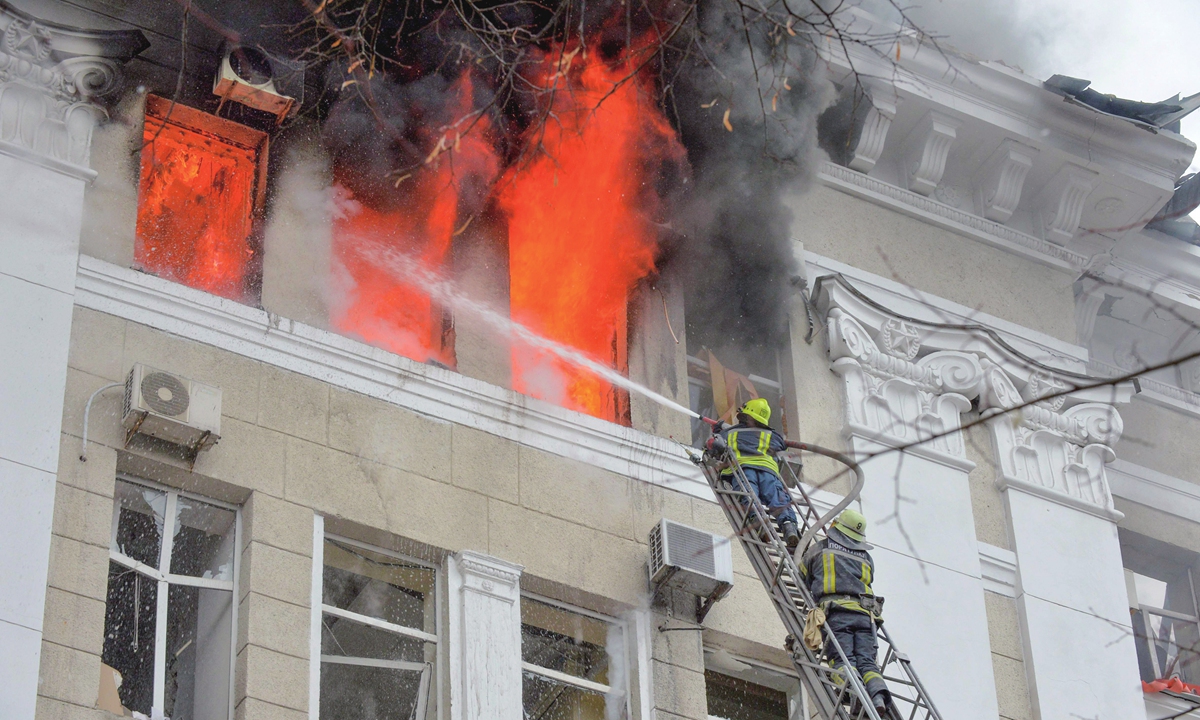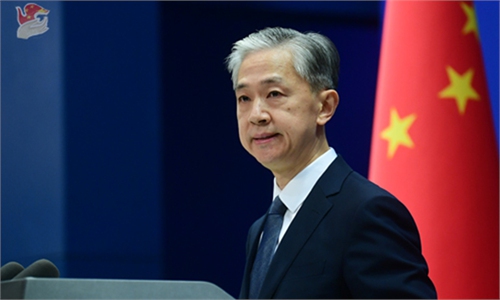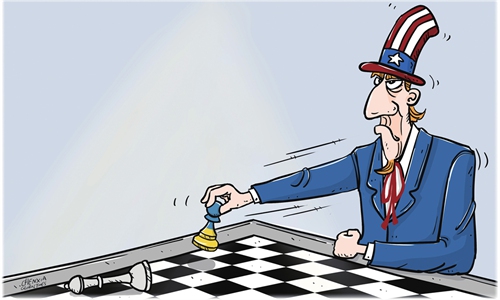Urgency of talks arises amid ‘rising cost, spillover effect’
Moscow, Kiev ‘still have strong willingness’ to talk despite huge difference

Vladimir Medinsky, (second left) head of the Russian delegation, and Davyd Arakhamia, (third right) faction leader of the Servant of the People party in the Ukrainian Parliament, attend peace talks in Gomel region, Belarus, Monday, Feb. 28, 2022. Photo: AFP
As Russia's military operation in Ukraine entered its seventh day, the world is closely observing the situation as the rising cost of the war is being felt not only by Russia and Ukraine, but also Europe, and has made the second round of negotiations for a possible ceasefire an urgent issue.
Countries like China have continued calling for diplomatic efforts to de-escalate Ukraine-Russia tensions, but the US-led Western bloc keeps fueling the crisis with more extreme sanctions and aggressive rhetoric, which would only lead to more conflicts, divisions and confrontations, experts said.
State Councilor and Foreign Minister Wang Yi had a phone conversation with Ukrainian Foreign Minister Dmytro Kuleba at the latter's invitation on Tuesday. Kuleba said "China has played a constructive role on this issue and that Ukraine is ready to step up communication with China. He looked forward to China's mediation efforts for the ceasefire." The conversation proved that some accusations and reports to distort China's neutral stance from some Western politicians and media are groundless.
Peace talks urgent
The second round of negotiations between the delegations of Ukraine and Russia is scheduled on Wednesday night local time. According to information obtained by TASS, the talks are to be held in Belarus, in the Bialowieza forest. However, there is still no certainty about this, TASS said.
A second round of talks between Ukraine and Russia will take place later on Wednesday, Russian state news agency reported, citing an aide to the Ukrainian presidential office.
Although there's been a huge difference between the stances of the two sides, they have a strong willingness to solve the problem through negotiation, said the Chinese analysts.
Rather than encouraging the two sides to find a solution through negotiations as China advocated, the US and the West showed little encouragement for the peace talks. Instead, the US and its allies have been inciting Ukraine to continue confronting Russia, experts said.
The spillover effect of the crisis has become palpable. For Russia, given the multiple rounds of West-led sanctions, its economy and finance have been under mounting pressure. As the military conflict drags on, Ukraine has also been seeing significant consequences, which cast a shadow over the future of European countries as well.
Some experts said that given the growing pressure on energy prices, in addition to inflation pressure and the risk of triggering a new financial crisis, advancing the diplomatic measures to solve the crisis is echoing the interests of all relevant parties.
Continuing the military operation while having negotiations could be the target of Russia, which shows that Moscow is concerned that the other side may protract the process which will bring more uncertainties, some experts said.

Firefighters work to contain a fire after a rocket attack in the complex of buildings housing the Kharkiv regional SBU security service and the regional police, in Kharkiv, Ukraine on March 2. Photo: VCG
Disrupting forces
"The US is unwilling to see the situation de-escalate soon, so it does not want to see any positive factors amid this crisis that could help ease the tensions, as the Ukraine crisis provides an opportunity for Washington to enhance its leading role in European security affairs," Li Haidong, a professor from the Institute of International Relations of China Foreign Affairs University, told the Global Times.
Belarusian President Alexander Lukashenko was quoted by Russian media as saying that Russian and Ukrainian counterparts will sit down at the negotiating table, but very powerful forces wish to derail this process.
"It is clear that the US needs geopolitical tensions to ease domestic pressure, but it also fears the tensions will burn the US itself. Russia would act tough to ensure its security if sanctions continue and even escalate, and threaten the Russian lifeline," said Lü Xiang, a research fellow at the Institute of American Studies at the Chinese Academy of Social Sciences. .
US President Joe Biden raised his anti-Russia rhetoric during his State of the Union address on Tuesday vowing that Russian President Vladimir Putin "will pay a continuing high price over the long run" while he may make gains on the battlefield.
In the 6,500-word speech, nearly 1,200 words were dedicated to the Ukraine crisis, with both Republicans and Democrats cheering when Biden summarized US and EU financial sanctions imposed on Russia, including the closing of airspace to Russian flights. Ukrainian ambassador to the US Oksana Markarova was present at the event.
Judging from the atmosphere, Lü believes Biden partly achieved his goal — to unite the two parties and demonstrate US leadership in NATO and in front of its European allies.
However, experts suspected the short-term solidarity in the first week of battle may soon be forgotten when Europe, particularly Germany which has close economic interactions with Russia, suffers the pain of cutting trade ties with Russia.
"We have responded to this question many times," Wang Wenbin, spokesperson of the Chinese Foreign Ministry, said during the press conference on Wednesday when he was asked whether China would follow as Western countries sanctioned Russia. Instead of putting the livelihood and economy of Russia in severe difficulties, the unilateral sanctions have never been an effective way of solving the problem, which would only escalate the confrontations and divisions, the Chinese official said.





